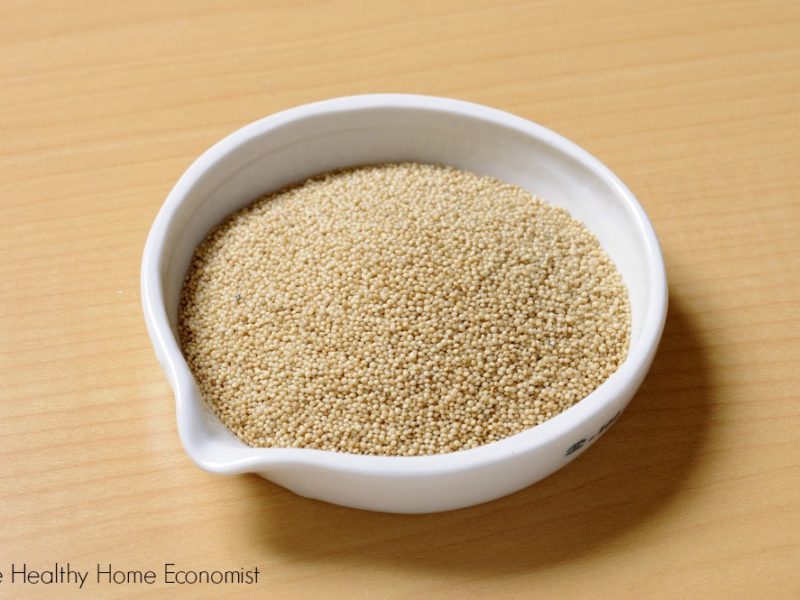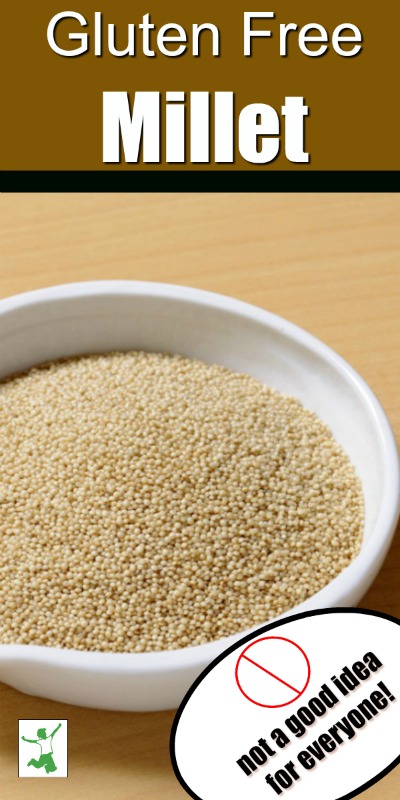Examination of why millet should optimally be eaten in moderation as a gluten-free whole grain in order to avoid disrupting hormone health.

Gluten allergies are clearly on the increase in our modern society. It seems like practically every other person I know these days has some sort of digestive issue that avoiding gluten would probably improve.
At the top of the list of gluten-containing foods is wheat. It is the indisputable, primary staple of the Western diet. Wheat is also the very foundation of the controversial USDA Food Pyramid.
Given how important bread and other wheat-based carbohydrates are to our society’s basic food requirements, it’s no wonder that folks seek a quick and easy substitute for wheat bread and wheat-based snacks when a gluten allergy or Celiac disease has been diagnosed.
Millet: Ancient Gluten-free Whole Grain
Enter millet. This ancient grain was cultivated in East Asia as far back as 10,000 years ago, according to archaeologists. Surprisingly, the cultivation of millet in prehistoric times was more prevalent than even rice, particularly in what is now China and the Korean peninsula.
Millet’s resistance to drought is perhaps the reason for its popularity in ancient times and its spread to Europe by 5000 B.C.
Despite the 5000 years cultivating this whole grain as a staple food, millet porridge is considered a traditional food in Russia as well as China. Use of millet is also widespread in Africa, like gluten-free teff, likely due to the drought-prone climate.
Millet Bread: Logical Substitute for Wheat
The protein structure of millet is quite similar to wheat. The one glaring exception is that millet is a gluten-free grain. Wheat contains copious amounts of this hard to digest plant protein.
When plain millet flour is used for baking bread (as opposed to homemade gluten-free flour or a healthy gluten-free flour mix from the store), the resulting loaf is light, white, and quite similar in texture to wheat bread. As a result, people who wish to avoid gluten tend to immediately gravitate to millet bread as the most logical and palatable substitute.
Millet bread is extremely popular in health food stores. Sami’s Bakery and Deland Bakery are two local bakeries that sell an absolute ton of millet bread to these stores around my local metro area.
I recently corresponded with a person up the East Coast of the USA who was consuming a lot of the millet/flax chips as an alternative to wheat-based snacks and had no idea of the potential health risks from consuming so much millet.
It was this discussion that led me to write this blog and warn folks about the dangers of consuming too much millet!
Potent Goitrogens
While millet does not contain gluten, it does contain goitrogens. These are substances that suppress thyroid activity and can lead to goiter. This condition involves enlargement of this very important gland which resides in the throat. Low iodine intake can also lead to goiter for those who rely on millet as a staple according to the Journal of Endocrinology and Metabolism.
Hypothyroidism is a serious and sometimes debilitating condition. It accompanies a weak or enlarged thyroid such as what occurs with goiter. Depression, difficulty losing weight, loss of hair, cold hands/feet, and fatigue are common hypothyroid symptoms. By some estimates, hypothyroidism is at epidemic proportions in Western society. (1)
Goitrogens in foods that contain them are usually reduced by cooking such as cruciferous vegetables like broccoli. However, cooking actually increases the goitrogenic effect of millet! Incidentally, the same effect occurs when fermenting soy.
Therefore, when folks begin eating large amounts of millet bread with a wholesale switch over from wheat, the thyroid suppressing effects of this simple dietary change can be profound. Injuring the thyroid can have a cascade effect on other glands as well. For example, those suffering from adrenal fatigue many times have thyroid issues as well.
Moderation is Critical
Protect your thyroid at all costs! It is a real challenge to unwind the effects of hypothyroidism once this vital gland is weakened or enlarged. Don’t take any chances with your thyroid health by consuming large amounts of millet bread or millet based snacks.
If gluten and/or wheat is a problem, then simply reduce bread consumption. Alternatively, use another grain that is both gluten-free and non-goitrogenic such as rice, oats or teff. Be sure to get quality, though, as rice is frequently high in arsenic.
Alternatively, try using grain-like gluten-free foods such as highly nutritious buckwheat, amaranth, or the starchy tuber cassava. They are excellent for baking too!
Millet bread consumption is fine in moderation if your thyroid is healthy – just don’t overdo it!
Given how difficult it is in modern society to maintain thyroid and overall glandular health, taking a chance by eating a lot of millet bread is a risky proposition indeed.
Traditional peoples did not have the constant stresses and strains on their glands like modern people do.
For example, they did not have to contend with pollution of their food, water, air and overall environment.
Therefore, we must be overprotective of our thyroid health. This includes avoiding regular consumption of foods that might impair it in any way.

Millet Alternatives That Preserve Thyroid Function
If you have thyroid issues and need alternatives to millet, here is a list of the healthiest options to consider.
- Einkorn Benefits (contains “good gluten“)
- Teff Benefits
- Yuca Root Benefits
- Arrowroot Benefits
- Wild Rice Benefits
- Farro (great if only modern wheat is the problem)








Sarah,
Thank you for calling attention to this interesting research on millet and thyroid function. The research you are citing concerns humans and rats who ate millet exclusively. I have lived in Africa where people eat millet for breakfast, lunch and dinner because they live in dry, sandy climates where other foods are not available. The appropriate conclusion to draw here is that people who eat ONLY millet may be more susceptible to thyroid disease than people with a more varied diet. I do not agree with your interpretation of this research as “people with thyroid problems should avoid millet”. There is no evidence that an occasional bowl of millet cereal or slice of millet bread is harmful to a person who is eating a balanced diet.
Thanks Sarah for the telling us about the risk of Millet. We can take precautions to protect our thyroid glands by taking supplements such Sea Kelp that has iodine in it.
In modern society foods that are eaten in developing world can cause problems for us due to our other unhealthy ways of living such lack of excersise, too much stress, poor nutrition due to excess of sugars and bad fats, preservatives etc. All this can contribute towards imbalance in our hormones and thyroid problems.
So if there is a risk of hypothyroidism with millet then all the other factors will contribute to exacerbating the condition. Hence in the modern world you can be more at risk of contracting hypothyroidism for consuming too much millet then in the developing world, where people eat whole food most of the time and they do not over indulging in manufactured processed foods.
I noticed you didn’t have Spelt in your list on heathy gains, is there a reason why?
Einkorn is a better form of wheat than spelt. Spelt is good, but it is still hybridized. Einkorn is the only form of wheat that is completely unhybridized and is the easiest form to digest.
Hi Sarah, What if we already have hypothyroidism? Can I consume millets or not.
If I had hypothyroidism, I most certainly would not be eating millet.
I’m watching a show on NYCTV right now about India. In this one town almost all they eat is Millet. That’s what prompted me to look it up. According to your claims they must all be sick.
Is there any thyroid problem from eating millets
Millet is a seed not a grain. You need to do more research rather th as n scare tactics.
It is most definitely a cereal grain … all grains are seeds!
I do not believe Millets and Thyroid problems are linked . Experts need to answer why a majority of the people who never took millets in their life time are suffering from Thyroid disease like Hypothyroidism. This is something people(Wheat and Rice Industry) are wrongly propagating with out any logic and evidence
I was reading how millet seed extract in some hair vitamin supplements helps your hair grow longer and thicker. Would millet be ok to consume in a hair supplement?
Hair vitamin supplements are made up of synthetic vitamins by and large. Why not just eat food that is nutrient dense? Pills don’t amount to much. Collagen would be an excellent food based addition to smoothies for extra hair/nail growth. https://www.thehealthyhomeeconomist.com/hydrolyzed-collagen-uses-and-benefits/
I see that the research is done only on pearl millet which i believe is Bajra. Any evidence on the types of millets like foxtail and barnyard?